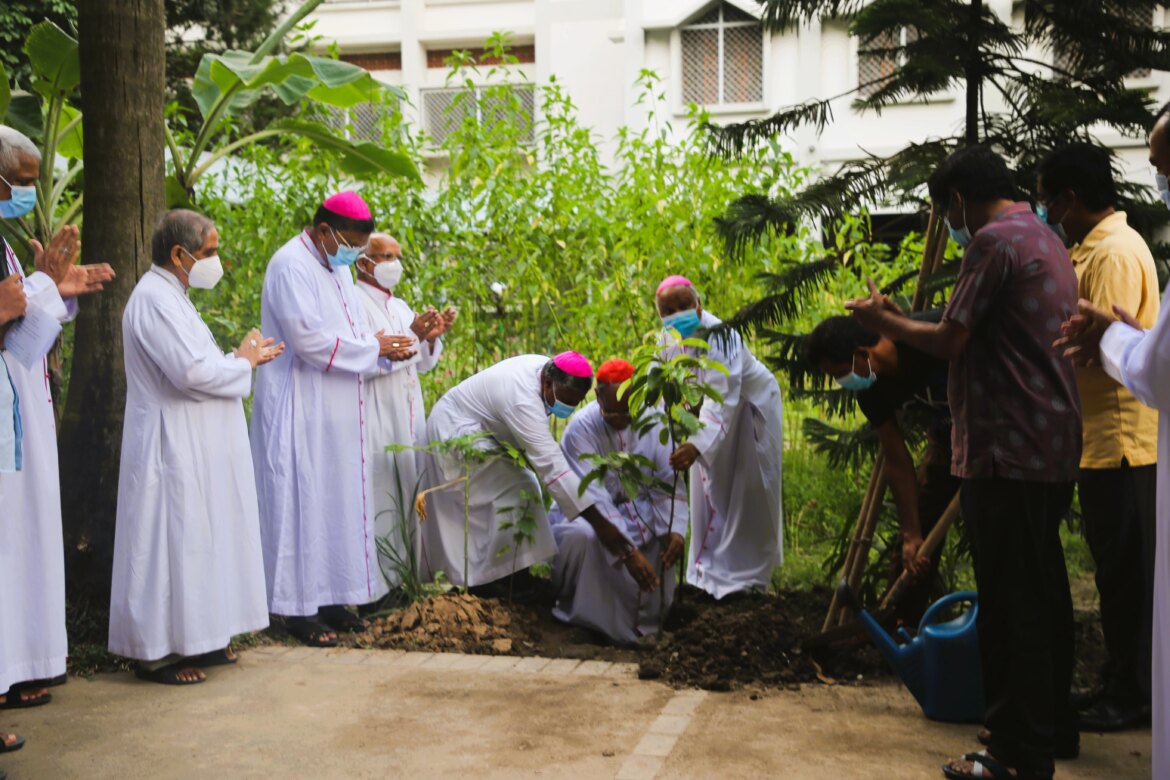Dhaka, Bangladesh, Sep 2, 2025 /
14:00 pm
In Bangladesh, the call for “care for nature” in Pope Francis’s encyclical Laudato Si’ has resonated deeply across religious lines. Christians, Protestants, and non-Christians alike have embraced its message, sparking environmental action in a country increasingly vulnerable to climate change.
Bangladesh, a coastal South Asian nation, faces frequent natural disasters — floods, cyclones, river erosion, and landslides — that claim lives and displace communities. Ranked as the ninth highest disaster-risk country globally, it sees hundreds of villagers migrating to cities each year due to river erosion and climate-induced hardship.
In response, the Catholic Bishops’ Conference of Bangladesh (CBCB) launched an ambitious initiative to plant one million trees nationwide.
The program began on August 14, 2020, during the COVID-19 pandemic, with all bishops present at the CBCB Center in Dhaka.
“Planting trees remains one of the most powerful actions we can take to combat climate change, which is why our bishops prioritize it,” Father Tushar James Gomes, assistant secretary general of the Catholic Bishops’ Conference of Bangladesh, told Catholic News Agency.
“Laudato Si’ has significantly raised awareness about the importance of caring for our environment,” he added. “People now understand that protecting nature is not optional — it’s essential.”
Tushar emphasized that the Church is moving beyond tree planting. “We are working to declare parishes and organizations as ‘green and clean.’ Many church-run organizations are phasing out plastic bottles and single-use items. Though not yet 100% successful, the effort continues.”
The Episcopal Commission for Justice and Peace has played a leading role in translating, promoting, and publishing Laudato Si’ in Bengali. Holy Cross Father Liton H. Gomes, secretary of the commission, told Catholic News Agency that public awareness about environmental care has grown significantly.
“There is now a strong sense of urgency,” he said.” Not only Christians, but also non-Christians who work with us or benefit from our services have shown solidarity with the message of Laudato Si’. They are planting trees and actively participating in environmental protection.”

The Church’s efforts also extend to socio-economic development, addressing another key theme of Laudato Si’ — care for the poor.
Gomes, a teacher and cooperative expert at Notre Dame College, said, “We’ve established cooperative societies in poor areas like Bandarban and Bagerhat to strengthen economic foundations.”
In border and hilly regions, where wild elephant attacks destroy homes and crops, the Church has provided financial aid. “Climate change is driving thousands of internal migrants to cities. Hundreds of people arrive in Dhaka daily, many of them climate victims. We’re trying to ease their suffering,” he added.
Catholic Hemanta Corraya, Secretary General of the Bangladesh Christian Association, shared that hundreds of trees planted under their leadership are now bearing fruit. “We’ve planted trees through our branches and at Dhaka Credit facilities,” he said. Hemanta also serves as president of The Christian Cooperative Credit Union Ltd., Dhaka, founded by American Holy Cross priest Father Charles J. Young.
“By planting trees, we’re working toward zero carbon emissions, aligning with UN Sustainable Development Goals 12 and 13,” Hemanta said. “The Holy Father’s Laudato Si’ is a significant guideline and inspiration for us. We welcome the Church’s initiatives and hope to continue contributing to a green and clean world.”
In the Rajshahi diocese, diocesan priest Father Sagor Corraya led the planting of 4,500 palm tree seeds in 2023-2024.
(Story continues below)
Subscribe to our daily newsletter
“Environmental awareness has grown. We’ve worked with schools and tribal communities like the Santals, who now actively plant trees,” he said. “Palm trees reportedly help prevent lightning strikes, which kill hundreds of people annually in Bangladesh.”
Father Sagor, director of the Rajshahi Pastoral Center, added, “We tell students: if the trees survive, the world survives. If the world survives, people survive.”
Interfaith workshops continue to strengthen the movement.
On June 27-28, 2025, a training on life and nature protection was held at the CBCB Center in Dhaka, attended by 90 participants, including Catholics and Protestants, organized by the Episcopal Commission for Justice and Peace and World Vision Bangladesh.
Rev. David A. Das, pastor of Bethel Assemblies of God Church and secretary of the National Council of Churches in Bangladesh, told Catholic News Agency that they learned about Laudato Si’ from the Catholic bishops. “Climate change is our life-and-death issue. All churches and people of all religions are deeply concerned about preserving this world. Pope Francis’s call through Laudato Si’ was timely, and we expressed full solidarity.”
Das added, “We’ve played an effective role in our churches. Members have planted trees, cared for the environment, and supported the poor. This activity is ongoing. Such letters should have come earlier — then people would have become conscious sooner. This letter has had a global impact.”
Mazharul Islam, a Khatib of Kawranbazar Mosque in Dhaka, participated in one interfaith discussion. “I was impressed by the summary of Pope Francis’s letter. He called the earth ‘Mother Earth’ and urged us to care for it and the poor. If we do that, the world will be beautiful.”
He praised the Christian community’s leadership. “They’ve acted not only from religious belief but also from humanitarian and environmental responsibility. Their efforts in education, social development, and eco-friendly activities are exemplary. Spreading this vision across society can build a moral and sustainable future.”
“Our Islam also teaches us to protect the environment and help the poor,” Mazharul added. “We’re discussing these issues in our mosques.”
From tree planting to interfaith dialogue, Bangladesh’s Christian community is living out the spirit of Laudato Si’, proving that care for creation transcends religious boundaries — making it a shared human responsibility.


